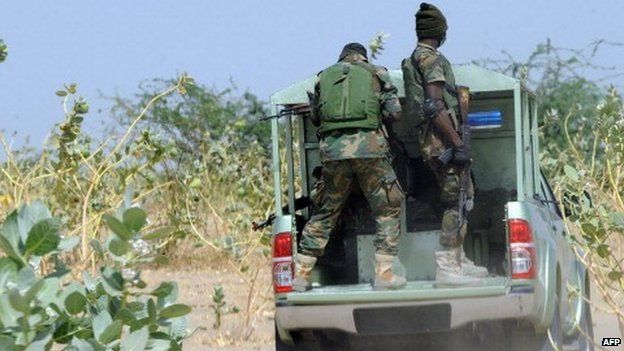Nigeria's Boko Haram 'shoots ex-President Obasanjo's son'
- Published

The son of Nigeria's former President Olusegun Obasanjo has been shot and wounded in a battle with militant Islamists, the ex-leader's aide says.
Lt Col Adeboye Obasanjo was injured as the army fought to recapture towns in north-eastern Adamawa state from Boko Haram, Muhammad Keffi told the BBC.
"Scores of insurgents" were also killed in the battle, the military said.
Last month, Boko Haram declared an Islamic state in areas it controls in north-eastern Nigeria.
Experts raised concerns that Nigeria, Africa's most populous country, could break up in a way similar to Iraq and Syria where the militant group Islamic State (IS) has declared a caliphate.
Boko Haram insurgents have over-run Michika and Bazza, two towns close to the commercial hub of Mubi, in recent days.
At the scene: BBC's Abdullahi Tasiu in Yola
The failure of the army to re-take Bazza - where Lt Col Adeboye Obasanjo was injured - has created panic.
Thousands of people are fleeing northern parts of Adamawa state where Boko Haram insurgents maintain a firm control of four towns - Madagali, Gulak, Michika and Bazza - and many surrounding villages.
Mubi, which is the largest commercial centre in the state, has been deserted. Many, fearing it will be the next target, have arrived in the state capital, Yola, taking refuge in the houses of relatives and at camps set up on the outskirts at Doubeli and Girei. One owner of a large five-bedroom house said about 200 people are now sleeping in it.
After Monday's offensive failed, the military appears to be intensifying air attacks. Many jets flew from Yola airbase to Boko Haram-occupied areas on Tuesday. Residents of Michika said fighter jets dropped bombs in two places in the town on Monday.
A resident of Mubi, which had a population of about 60,000, told the BBC's Focus on Africa radio programme that all businesses in the city, including banks, were shut.
Most civilians had fled, along with some soldiers, he said.
"Any minute from now I'm going to leave. I'm afraid to die," the man said.
The attack on a platoon headed by Col Obasanjo coincided with a ferocious air assault on the militants, Nigeria's privately owned This Day newspaper reports.
Col Obasanjo was in a stable condition in hospital, Mr Keffi told the BBC's Hausa service.
His front-line role showed the family's commitment to "one Nigeria", Mr Keffi said.
A total of two officers and three soldiers were wounded in the battle, the military said.
'Cross-border raid'
Olusegun Obasanjo fought in Nigeria's 1967-1970 civil war, when the military put down a rebellion to create the breakaway state of Biafra in the south-east.
A former military ruler in the late 1970s, he won two elections when Nigeria returned to multi-party democracy in 1999.
In May, he said President Goodluck Jonathan was "overwhelmed" by the security situation in the north-east and he should not run for another term in elections due next year.
Boko Haram's five-year insurgency is seen as the biggest threat to Nigeria's territorial integrity since the 1967-70 conflict, analysts say.
The group has changed tactics in recent months, holding on to towns in the north-east, where most people are Muslims, rather than carrying out hit-and-run attacks.
Who are Boko Haram?
- Founded in 2002
- Initially focused on opposing Western education - Boko Haram means "Western education is forbidden" in the Hausa language
- Launched military operations in 2009 to create an Islamic state
- Thousands killed, mostly in north-eastern Nigeria - but also attacks on police and UN headquarters in capital, Abuja
- Some three million people affected
- Declared terrorist group by US in 2013
West African military chiefs are due to meet in Ghana's capital, Accra, to discuss the growing threat Boko Haram poses to regional stability.
On Monday, Cameroon's military said it had killed more than 100 militants after they fired shells into the small border town of Fotokol.
Two Tuareg fighters were clearly identified amongst the dead, Cameroon's Communications Minister Issa Tchiroma said at a press conference.
If true, it increases suspicion that Boko Haram is recruiting fighters from other countries, possibly Niger and Mali, as Nigeria does not have a Tuareg population, analysts say.
Last year, Mr Jonathan imposed a state of emergency in Borno, Adamawa and Yobe states, vowing to send more troops to crush the insurgency.
However, Boko Haram militants have stepped up their offensive and caused international outrage in April when they captured more than 200 girls from a boarding school.
Countries such as China, France, the UK and US have sent military assistance to help find the girls but they have not yet been rescued.